Going Global to Change Lives
December 02, 2021
Roe Green Global Health Scholar travels to Sierra Leone to perform surgeries in sub-Saharan Africa
University Hospitals is having an impact halfway around the world through the work of Rachel Pope, MD, MPH, a gynecologist and Roe Green Global Health Scholar. Her work is evidence that the Roe Green Center for Travel Medicine & Global Health covers more than vaccinations and check-ups for adults and children traveling abroad. In significant cases, UH is bringing its expertise to the world.
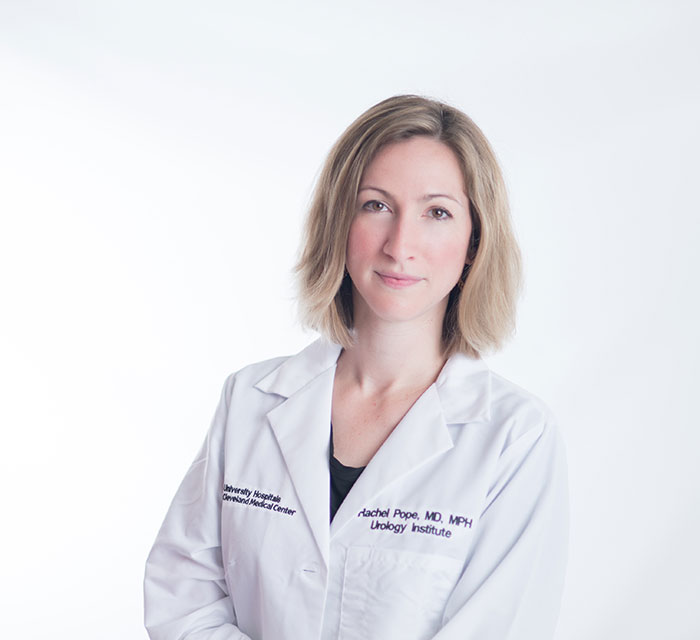 Rachel Pope, MD, MPH
Rachel Pope, MD, MPHDr. Pope traveled to Sierra Leone earlier this month, accompanied by reconstructive urologist Kyle Scarberry, MD – both part of University Hospitals Urology Institute – to continue her work training surgeons to repair obstetric fistulas, which can develop during labor when the baby gets stuck in the birth canal. This complication renders women incontinent. A condition that can easily be prevented in the United States through reliable access to emergency obstetric care and Cesarean sections can have severe life-changing consequences for rural African women without access.
Through the Roe Green Center for Travel Medicine & Global Health, Dr. Pope has been awarded a $35,000 grant to develop an online training platform and app for physicians in sub-Saharan Africa. She has been creating a curriculum, particularly for those who are training in fistula repairs, to enhance their mentorship with video lectures, research articles and in-person surgical coaching.
Dr. Pope has already trained approximately 20 surgeons on trips to Sierra Leone, Cameroon, Malawi and Madagascar. Previously, she worked with non-profit humanitarian groups like the Scottish-based Freedom from Fistula and the Christian organization Mercy Ship, a floating hospital that stations off the coast of Africa to perform surgeries for patients who would otherwise be marginalized. She has spent a combined 4 ½ years overseas repairing fistulas for more than a thousand women. Through training other surgeons, many more women are able to access surgical treatment.
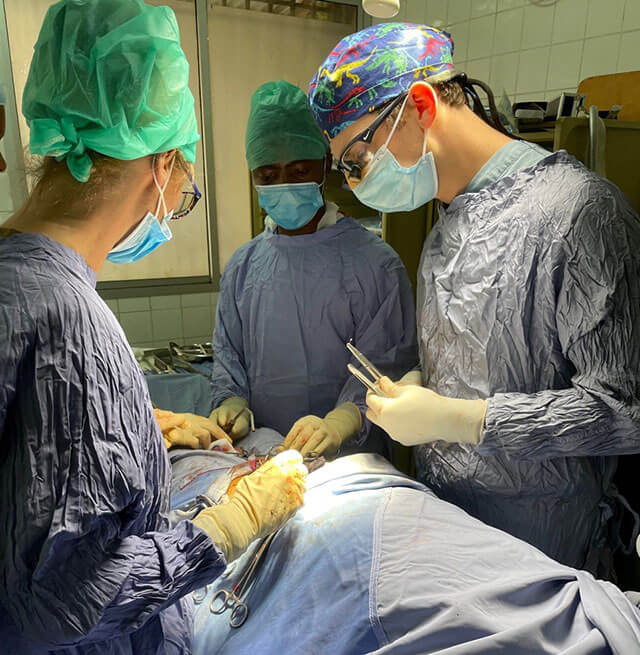 Caption: Dr. Kyle Scarberry works with resident surgeons in Sierra Leone.
Caption: Dr. Kyle Scarberry works with resident surgeons in Sierra Leone.Now, UH is funding Dr. Pope’s surgical trips to Africa as a Roe Green Global Health Scholar. By creating a clear curriculum from material she has developed, she can pass on her own training to other physicians in Africa to better serve their communities. Dr. Pope is focusing on training those who work remote from specialized centers to do the simpler, more straightforward procedures. She is teaching these surgeons about prevention of fistulas, as well as post-surgical recovery and catheter care, and helping them determine which cases are complex and need to be referred to an expert.
“Surgeons in rural parts of countries burdened by obstetric fistulas were doing what they could to help women, but they just didn’t have the foundational training needed to achieve successful repairs,” said Dr. Pope. “More complicated cases should not be repaired in under-resourced rural hospitals, as they need specialized instruments and nursing care. In order to eradicate obstetric fistulas, the rural hospitals must allocate their efforts toward prevention and refer complex repairs to experts.”
Treating the traumatized
Women in sub-Saharan Africa suffer from the highest maternal mortality rate in the world, more than double the global average, according to a UNICEF report. Less than two-thirds of births are even attended by trained healthcare personnel. If a pregnant woman has a difficult delivery, where the baby’s head is stuck and pressing for hours on the soft tissue of the pelvic floor, the pressure impedes the blood supply and forms a fistula or hole between the vagina and the bladder (vesico-vaginal) or the vagina and the rectum (recto-vaginal). She often faces a tragic future without adequate medical care. Dr. Pope explained that approximately 90 percent of the time, the baby dies. The mother is not only left bereft but incontinent. It is difficult to manage the incontinence without resources, and the odor of leakage often makes it unbearable for others living in close quarters with her. Sometimes from social pressure and sometimes due to shame, the incontinent woman ends us isolating herself, said Dr. Pope.
“People may think that a woman is ‘cursed’ to not have a baby and to end up incontinent, and then she is shunned by her community,” Dr. Pope said.
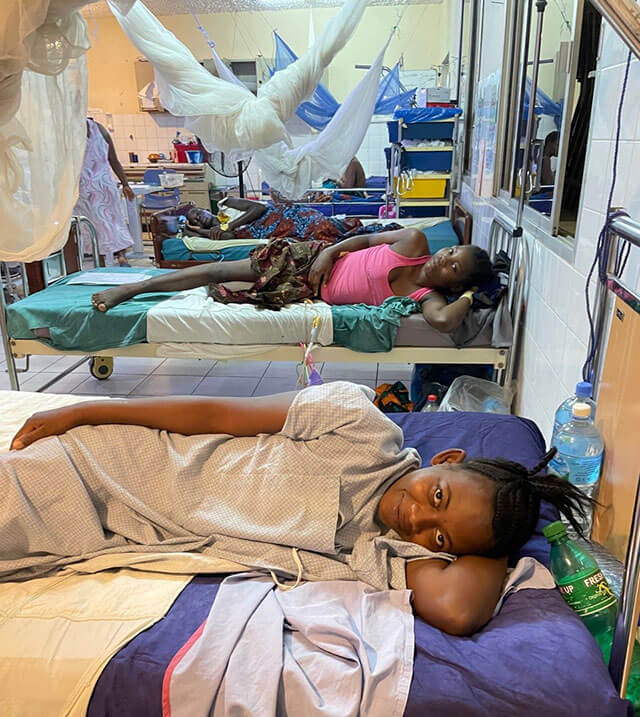 Caption: Patients rest with catheters after surgery.
Caption: Patients rest with catheters after surgery.“We want to train more local physicians to treat this condition, so that it heals after the first surgery, which is the best way to reduce harm to these women who were already traumatized by the process that led to the fistulas. Being a Roe Green Global Health Scholar helps make this vital work possible.”
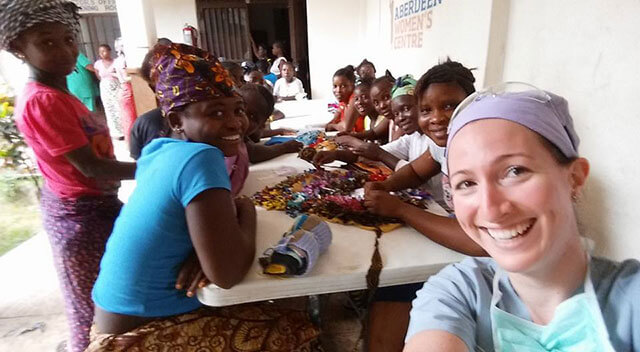 Caption: Dr. Pope with patients on a previous trip to Sierra Leone in 2015.
Caption: Dr. Pope with patients on a previous trip to Sierra Leone in 2015.Prior to the pandemic, Dr. Pope often worked abroad with residents and fellows in training. Dr. Scarberry, who was a urology resident when Dr. Pope was a gynecology resident at UH, joined her on this surgical mission.
Trained in technique, guided by compassion
Dr. Pope is fellowship-trained in global women’s health, focusing on obstetric fistula repairs that occur during childbirth. This training included bladder and vaginal reconstruction. As Chief of Female Sexual Medicine in the UH Urology Institute, she specializes in vulvar and vaginal disorders that can cause sexual dysfunction and genitourinary syndrome of menopause.
She has been specializing in obstetric fistulas since researching them nearly 15 years ago, while working on her thesis and capstone project for a combined bachelor’s degree in anthropology and master’s degree in public health at Case Western Reserve University. And she has witnessed and treated conditions she has never encountered in the United States, but which have informed her expertise as a surgeon. Now she is able to combine her passions through her position in the UH Urology Institute.
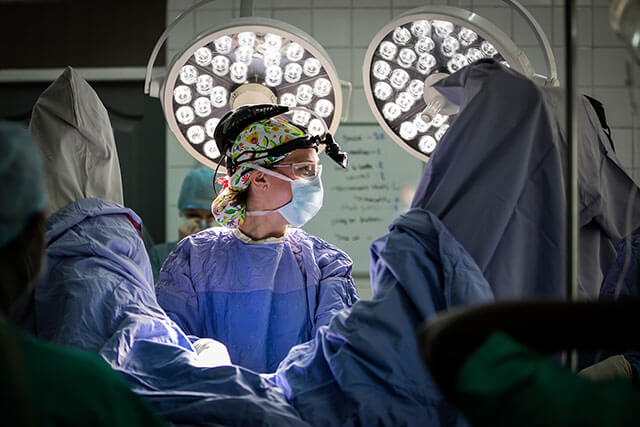 Caption: Dr. Pope operating in Malawi, photo credit: Smiley Poole.
Caption: Dr. Pope operating in Malawi, photo credit: Smiley Poole.“We are so fortunate to have Dr. Pope at University Hospitals and to have support from the Roe Green Center,” said Lee Ponsky, MD, Chairman of the Department of Urology, and Director, UH Urology Institute, “Her dedication to global women’s health and passion for social justice is remarkable. She’s not only committed to the underserved in sub-Saharan Africa, she leads a new multi-disciplinary, clinical division for female sexual health while still doing important research and training residents.”
“I know for a fact that Dr. Pope is improving lives around the world.”
The work of Dr. Pope and other Roe Green Global Health Scholars demonstrates a new dimension of the work conducted by the Roe Green Center. UH had the first travel medicine clinic in the country for both adults and children that is staffed by physicians in an academic medical center.
Watch for more profiles on our Global Health Scholars.
Tags: Travel Medicine, Female urology


